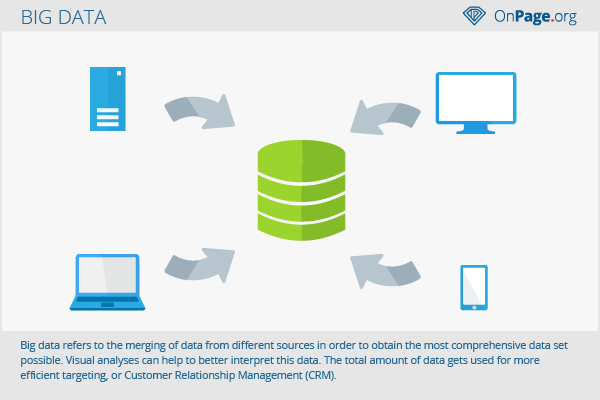Big Data
Big data refers to the merging of data from different sources in order to obtain the most comprehensive data set possible. Visual analyses can help to better interpret this data. The total amount of data gets used for more efficient targeting, or Customer Relationship Management (CRM). The overall objective of the gathering of big data is an increase in conversions or sales. The databases that are referred to as big data require storage capacities that can no longer be measured in gigabytes. However, there is no set limit that determines when you start calling it big data.
Development
With the rapid development of storage media, there are even more ways to analyze large amounts of data and profit from it. Additionally, the amount of data worldwide has increased just as much. It is predicted that data volume will double every two years worldwide. The reason for this is the increasing digitization of the world. While databases were previously maintained or entered manually, this gets handled today by machines and fast computers. Whether shopping in the supermarket, booking a trip, ordering a meal at a restaurant, or managing one’s health insurance data, each and every step is recorded, managed, and organized by computers.
Big data is thus a consequence of a general trend of mankind to produce ever larger volumes of data. Today big data is used both in science and in business.
Technical requirements
The processing of large amounts of data requires many steps. But big data can no longer be processed efficiently with conventional technology because it presupposes that the software can handle the following:
- process multiple records at once
- import large amounts of data quickly
- make databases available quickly
- handle multiple database queries at the same time
These conditions are fulfilled by paid programs such as NeuroBayes, but also software such as Hadoop.
Big data – areas of application
Especially large companies see significant advantages with big data over competitors that have less data available to them. At the same time, a lot of money can be saved when entire business processes can be controlled based on automatically read data. But even in science, completely new evaluation approaches to be tested on a statistical basis are possible only with the help of big data.
The following applications are conceivable and are used in practice:
- Automated and fast market research that can respond immediately to changes
- Uncovering fraud in financial transactions
- Comprehensive web analytics to increase and optimize online marketing campaigns
- Comprehensive medical diagnostics
- Control of energy consumption, e.g. in a smart grid
- Expanded possibilities in e-commerce through flexible upselling or cross-selling
- Dragnet investigations or profiling for intelligence services or police
Critical handling of large volumes of data
Big data is considered to be an important component in online marketing. Especially large brands can work with larger data sets that provide more marketing potential. However, big data, similar to targeting, is often criticized because highly precise user profiles can be created with large amounts of data. This makes big data a huge invasion of user privacy. Companies that work with big data have to advise their customers or visitors as part of privacy policy that user data is further processed.
Companies like Google or other search engines providers that are financed through advertising, have been working with big data for years which they get from user data and other available sources. The regular debates about privacy illustrate the problem field of “big data,” since this presents individual companies too much data sovereignty. But even with other users of big data, there is an increased risk that the data will be misused and that this abuse will harm citizens in the long run.
Another criticism of big data is that it can only be analyzed based on algorithms due to the immense amount of data and thus has a very technical orientation. However, the IT industry is at the very beginning of handling large amounts of data and more precise evaluation methods can be expected.
Benefits for SEO
If you consider the options provided by web analytics tools such as Google Analytics, it is obvious that SEOs will also benefit from big data. Through benchmark comparison, keyword tools etc., search engine optimizers gain partial results from huge datasets that are clearly presented in order to use them to optimize their projects. Large companies likewise may also get important information for SEO strategies and targeting if they merge their databases.

